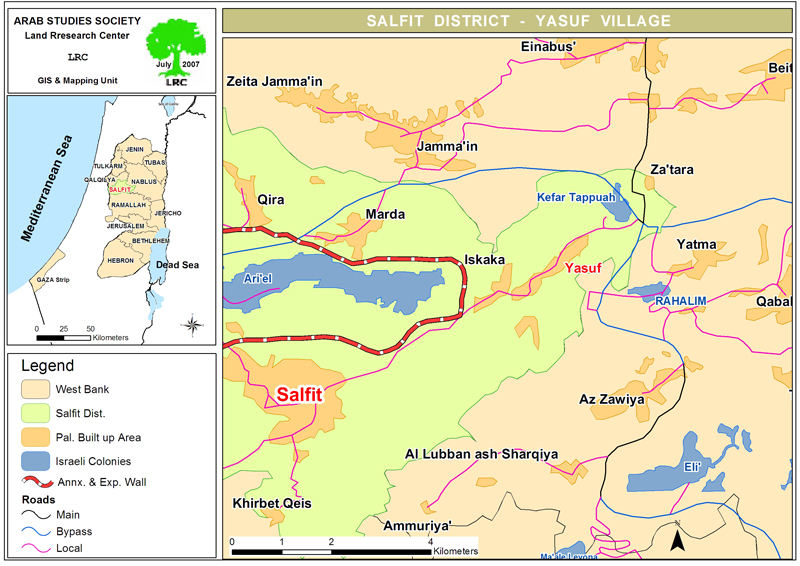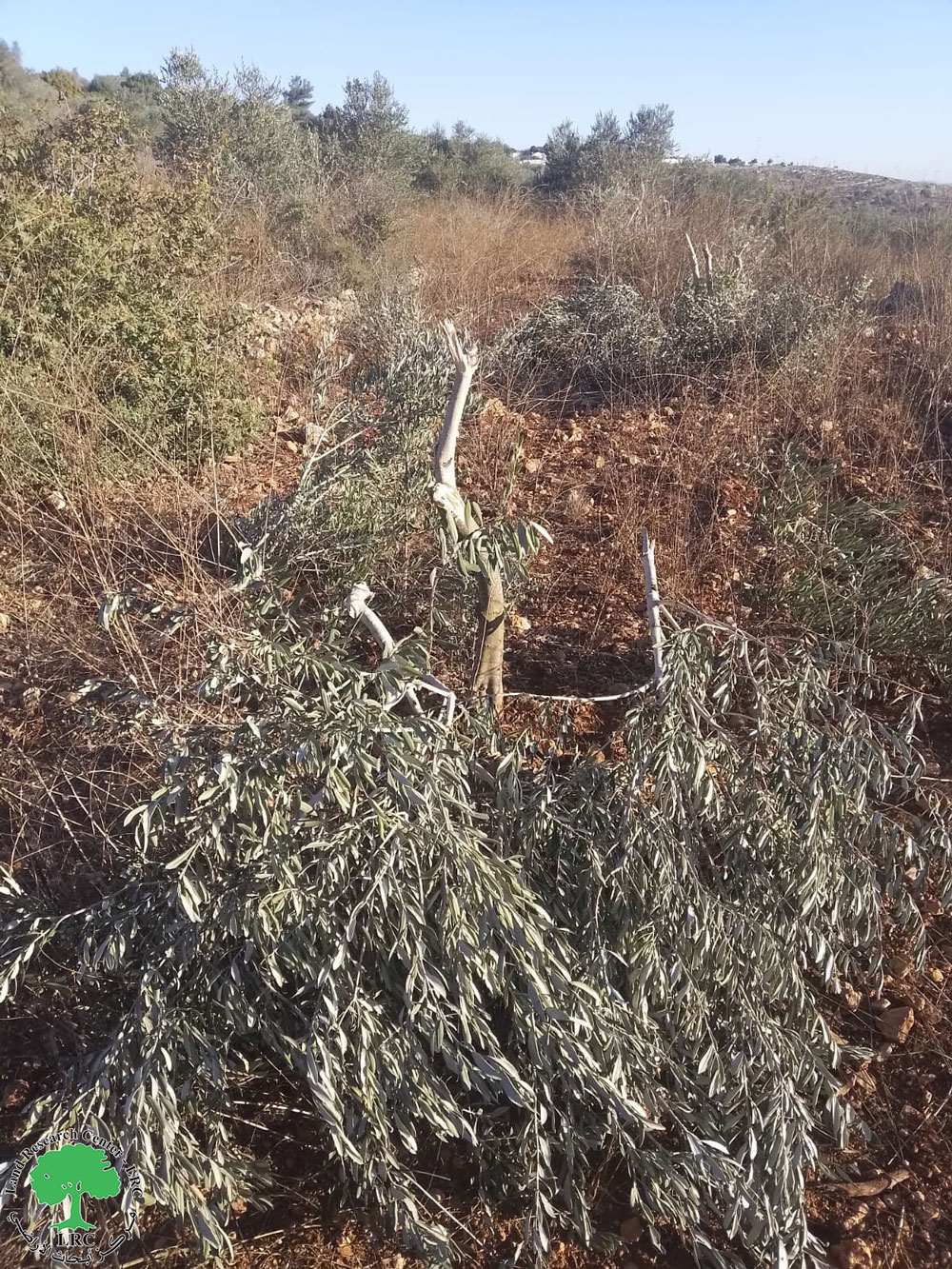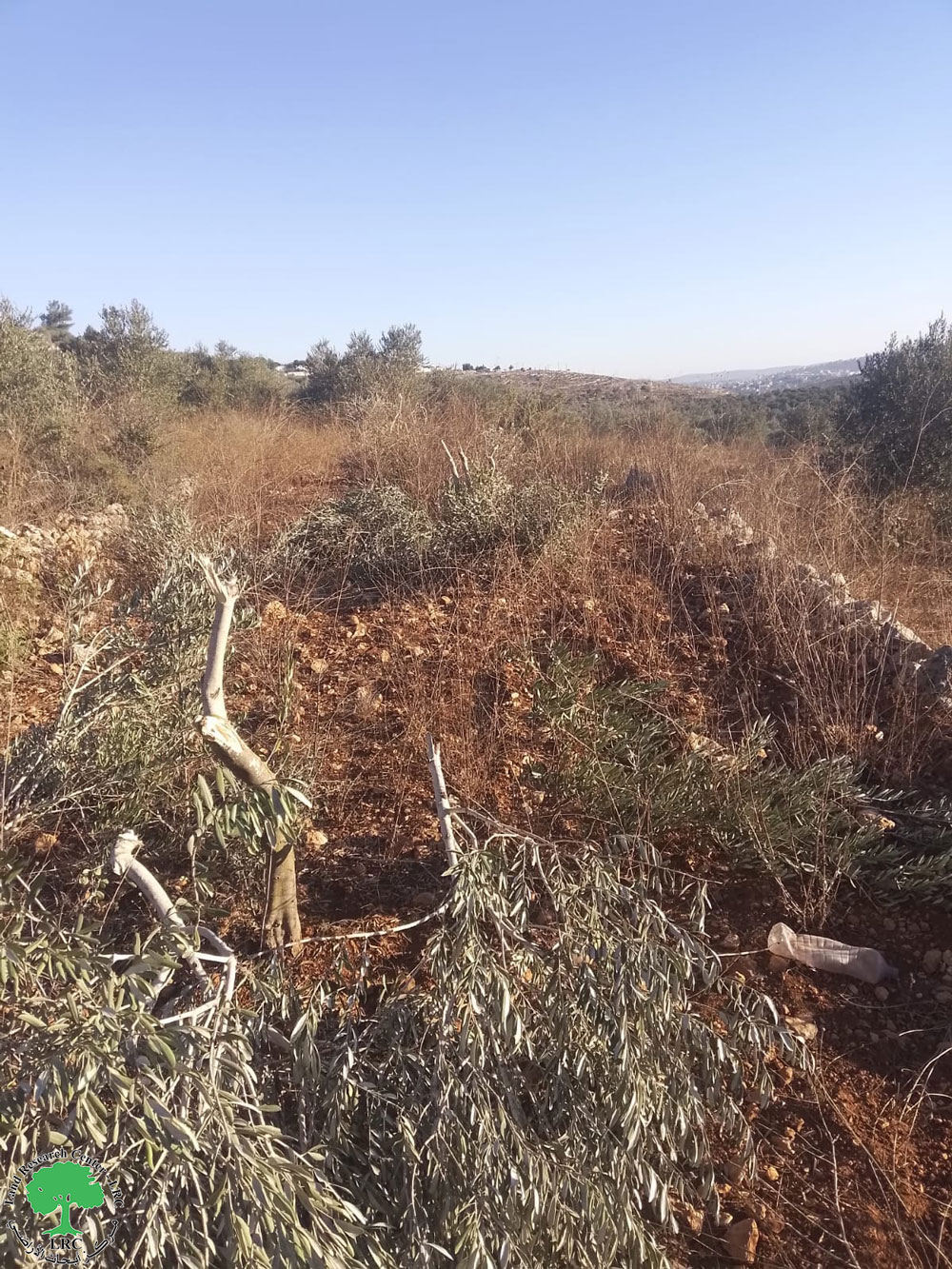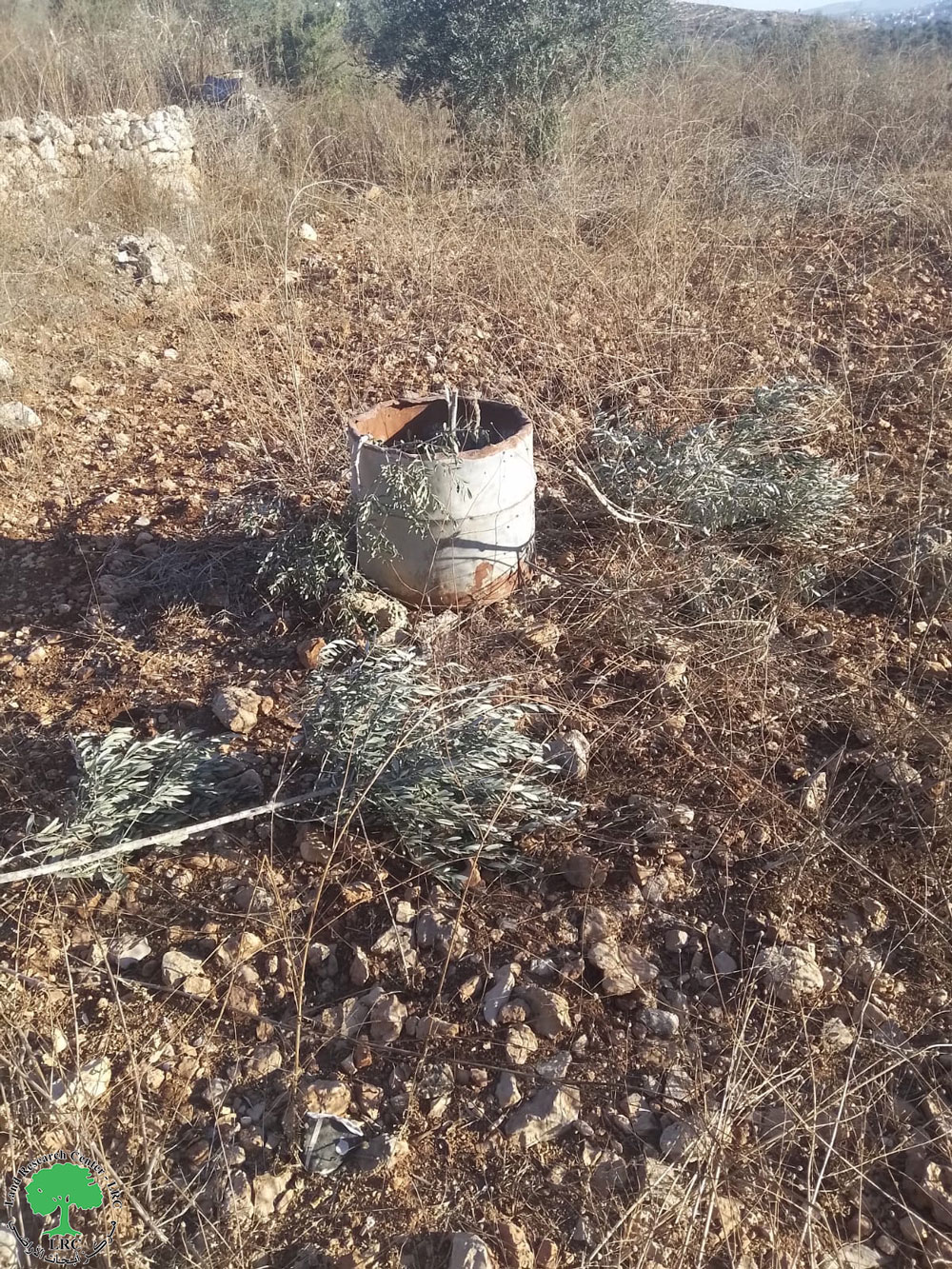To disrupt this year's olive harvesting season, settlers cut down 30 olive trees in Yasuf village/Salfit Governorate
Violation: Cutting and damaging 30 productive olive trees.
Location: Yasuf village, east of Salfit Governorate.
Date of violation: 23/10/2024.
Perpetrators: Settlers from the "Taffouh" settlement.
Affected party: Farmer Jihad Rabah Abdel Razek.
Description:
On the morning of Wednesday, 23rd October 2024, a group of settlers targeted a plot of land with fruitful olive trees in the "Al-Karm" area, east of Yasuf village in the Salfit Governorate.
The settlers cut and damaged 30 productive olive trees during the ongoing olive harvesting season. The damage involved cutting branches and causing partial harm to the trees. These trees belong to farmer Jihad Rabah Abdel Razek, who supports a family of four, including two females, with no minors in the household.
The affected farmer stated:
"I headed on Wednesday morning to harvest the olive fruits from my land, accompanied by my brother Imad. When we arrived at the land, I saw that 30 trees had their branches completely broken. It’s worth noting that the same plot of land had its trees cut down by settlers about four years ago."
The targeted land is located 800 meters from the "Taffouh" settlement and is one of the areas frequently targeted by the same settlers. It has become a site for destruction and vandalism by settlers who aim to impose their control over the entire area and carry out its complete Judaization.
Introduction to Yasuf Village[1]:
Yasuf village is located 16 km south of Nablus city. It is bordered to the north by the towns of Huwara and Jama'in, to the west by Marda village, to the east by Yitma village, and to the south by Iskaka village. The village had a population of 2,093 as of 2017 and spans a total area of 6,037 dunums, of which 330 dunums are designated as the built-up area.
The Israeli occupation has confiscated 814 dunums of the village’s land for the following purposes:
Israeli Settlements: A total of 659 dunums of village land have been seized for the benefit of two settlements. The first, "Kfar Tapuah", was established in 1978 and has confiscated 649 dunums, housing 523 settlers. The second settlement, "Rekhalim–Shvut", established in 1991, has taken over 10 dunums.
Bypass Roads: Bypass Road No. 508 has confiscated over 155 dunums.
Additionally, most of Yasuf village’s lands fall within Area C, which is under full Israeli control, making it a near-daily target. According to the Oslo Accords, Yasuf village is divided into Area B (1,427 dunums) and Area C, which constitutes the majority of the village’s total area (4,609 dunums).
Legal Commentary:
The Palestinian environment as a whole faces numerous environmental violations by the Israeli occupation, disregarding all international and national laws and norms related to protecting environmental rights. The right to live in a clean and safe environment is an inherent human right since the dawn of creation. The occupation consistently attempts to appear as a supporter of international environmental concerns, despite signing major environmental protection agreements such as the Basel Convention (1989), the Rotterdam Convention (2008), the Stockholm Convention (2001), and the Ramsar Convention (1971), as well as air quality and climate charters. Nevertheless, it violates all these treaties without accountability or oversight.
Additionally, there are specific provisions guaranteeing the right to enjoy a clean and safe environment for those living under military occupation, as per international laws, covenants, and treaties, such as the International Covenant on Economic, Social, and Cultural Rights, adopted by the UN General Assembly resolution 2200A (d-21) on December 16, 1966. Article (1), paragraph (2), states: "...All peoples may, for their own ends, freely dispose of their natural wealth and resources without prejudice to any obligations arising out of international economic cooperation, based upon the principle of mutual benefit, and international law. In no case may a people be deprived of its own means of subsistence."
Undoubtedly, the violations committed by the Israeli side contradict the laws of the "occupying state" itself, in addition to other laws. Referring to the specifics of this situation, Israel's Penal Code of 1977 and its amendments stipulate that trespassing on others' property to commit a criminal act is punishable under the law. Article 447 states: "Anyone who does any of these acts with the intention of intimidating, insulting, or harassing the owner of a property, or committing a crime, shall be punished with imprisonment for two years."
(1) Enters or crosses the property;
(2) After lawfully entering the property, remains there unlawfully.
(b) A crime under this section is committed when the offender carries a firearm or a cold weapon, with a punishment of four years' imprisonment."
By reading the text of this article, it is clear that the Israeli Penal Code criminalizes the mere act of unlawfully entering someone else’s property with the intent to insult, harass, or intimidate, imposing a penalty of two years' imprisonment. The penalty doubles when the trespasser commits a crime on another’s property using a weapon, sharp tool, or even by misusing the land as their own or exploiting it however they wish. This is explicitly criminalized in the above mentioned article of the Israeli Penal Code.
Accordingly, the Israeli aggressor, by cutting down trees, has caused severe environmental pollution in the area, blatantly violating international laws and treaties, as well as their own internal laws—a clear contradiction. Therefore, the "Israeli judiciary" must hold the settlers accountable for these actions under the provisions of their laws. However, there is no legal accountability imposed on the aggressor by the Israeli judiciary. This does not, however, negate the inherent right of every human being on this earth to live in a clean, safe, and secure environment free from violations and aggression.
[1] Source: LRC.
مشروع: حماية الحقوق البيئية الفلسطينية في مناطق "ج" SPERAC V - FCDO
Disclaimer: The views and opinions expressed in this report are those of Land Research Center and do not necessarily reflect the views or positions of the project donor; the Norwegian Refugee Council.
إخلاء المسؤولية: الآراء ووجهات النظر الواردة في هذا التقرير هي آراء ووجهات نظر مركز أبحاث الأراضي ولا تعكس بالضرورة وجهات نظر أو مواقف الجهة المانحة للمشروع؛ المجلس النرويجي. للاجئين




